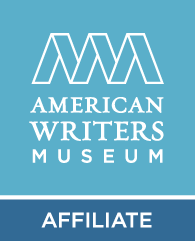[vc_row][vc_column][vc_column_text]
Welcome to Freedom to Read Week at the Kurt Vonnegut Museum and Library (KVML) in Indianapolis. As most of you know, this annual event promotes the First Amendment and the right to read and write. Each year, we take a “prisoner,” who is “locked” behind a wall of banned books for the week and serves as our Freedom to Read ambassador. Meet this year’s guest, Brett Stoker, a teacher, coach, and long-time supporter of KVML. He’ll be posting his thoughts daily, so be sure to check in often to read what he has to say.

As Kurt said, “History is merely a list of surprises,” and I would contend that that principle applies to individual histories as well, so to answer why I am here, well, is complicated . . . a series of fortunate surprises.
All this happened, more or less . . .
Last winter, I ran into Julia Whitehead at a poetry reading, and at one point I shared an idea for Banned Books Week: host a librarian or a teacher as KVML’s prisoner, someone who’s most affected by book banning. Julia nodded politely, which I thought was the end of it. An hour later she asked, “So, are you going to be our prisoner?” And here I am.
But before that, I had been involved with KVML for several years . . . attending and volunteering at events, bringing students down to be entertained, educated, and somewhat scandalized by Curator Chris Lafave and the rest of the staff. And before that, I attended the KVML Teaching Vonnegut workshop, where I got to hang out with experts and other fans. And before that, I taught a course on Indiana Authors, where Slaughterhouse-Five and Kurt Vonnegut’s (KV) short stories were always a hit. And before that, I received a Lilly Endowment Teacher Creativity Fellowship to study and interview contemporary Indiana writers. And before that, I had a great professor at Ball State University who inspired me to become an English teacher. And before that, I grew up in a house with a lot of books and a mother who read and still reads voraciously. And so on.
So back to why I’m here: For me, the thing that makes the KVML so special, aside from the greatness of KV himself, is that it’s so much more than a museum and library; it’s a living tribute not just to the man and his writing but also to the causes he championed throughout his life . . . supporting veterans while advocating for peace, promoting common decency, and raising awareness about mental health issues, to name a few. Most importantly for me is the KVML’s advocacy for free speech. I am fortunate that, at Tipton High School, I have never been told by an administrator that I couldn’t teach a piece of literature, even though nearly every book I teach is on the American Library Association’s Banned Books list. I have, however, had substitute teachers voice their disapproval and parents who did not want their child to read a certain book, and I’ve heard that an administrator took it upon himself to remove books from our corporation’s libraries. We teachers never know what threat to our and our students’ intellectual freedom will come with the next administrator or school board member or concerned parent, so the freedom to read is a constant concern, an ongoing battle.
Books and poems and stories and plays and ideas that challenge our worldview are the lifeblood of an education. They make us think; they make us question; they offer us new perspectives; they shock us out of our complacency; they make us better. In that way, they are sacred, and teachers and librarians are on the front lines protecting that sacredness from those who want everyone to think and believe a certain way. Organizations like the KVML and events like Freedom to Read Week use this platform to support and celebrate the freedom of thought and expression that is vital to a just society.
When I was ten years old, I walked uptown to my local public library to get a book. I don’t remember what book I brought to the front desk, but I do remember that the librarian wouldn’t let me check it out. She said it wasn’t appropriate for me. So, feeling a little ashamed, I walked home, where my mom asked me where my book was. When I told her what had happened, she dropped what she was doing, drove to the library, and told the librarian that her son could read any book he thought he could tackle. For that, and many other reasons, my mom is a hero. I guess that lesson stuck with me.

And that, to make a short story long, is why I am here, imprisoned behind a wall of banned books.
[/vc_column_text][/vc_column][/vc_row]



